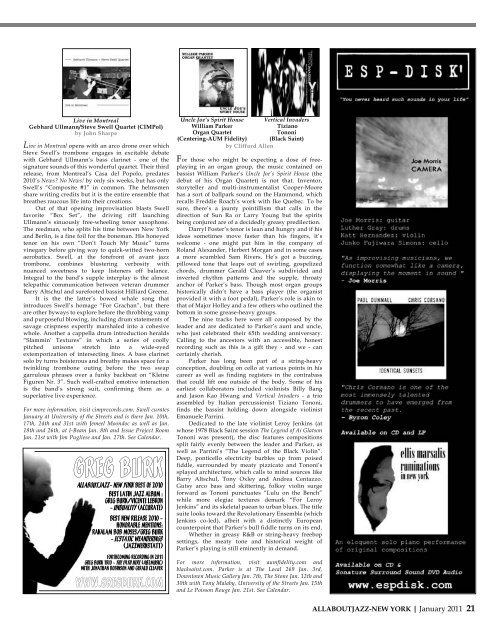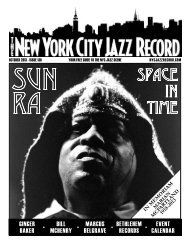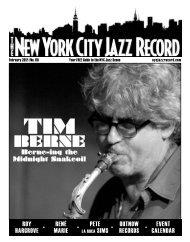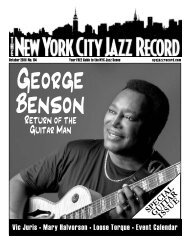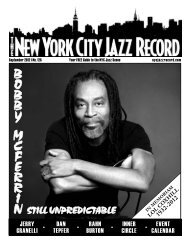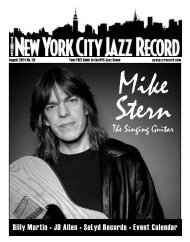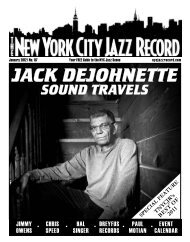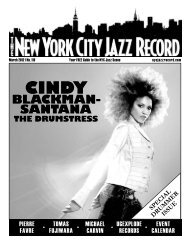heart of gold - The New York City Jazz Record
heart of gold - The New York City Jazz Record
heart of gold - The New York City Jazz Record
You also want an ePaper? Increase the reach of your titles
YUMPU automatically turns print PDFs into web optimized ePapers that Google loves.
Live in Montreal<br />
Gebhard Ullmann/Steve Swell Quartet (CIMPol)<br />
by John Sharpe<br />
Live in Montreal opens with an arco drone over which<br />
Steve Swell’s trombone engages in excitable debate<br />
with Gebhard Ullmann’s bass clarinet - one <strong>of</strong> the<br />
signature sounds <strong>of</strong> this wonderful quartet. <strong>The</strong>ir third<br />
release, from Montreal’s Casa del Popolo, predates<br />
2010’s <strong>New</strong>s? No <strong>New</strong>s! by only six weeks, but has only<br />
Swell’s “Composite #1” in common. <strong>The</strong> helmsmen<br />
share writing credits but it is the entire ensemble that<br />
breathes raucous life into their creations.<br />
Out <strong>of</strong> that opening improvisation blasts Swell<br />
favorite “Box Set”, the driving riff launching<br />
Ullmann’s sinuously free-wheeling tenor saxophone.<br />
<strong>The</strong> reedman, who splits his time between <strong>New</strong> <strong>York</strong><br />
and Berlin, is a fine foil for the boneman. His honeyed<br />
tenor on his own “Don’t Touch My Music” turns<br />
vinegary before giving way to quick-witted two-horn<br />
aerobatics. Swell, at the forefront <strong>of</strong> avant jazz<br />
trombone, combines blustering verbosity with<br />
nuanced sweetness to keep listeners <strong>of</strong>f balance.<br />
Integral to the band’s supple interplay is the almost<br />
telepathic communication between veteran drummer<br />
Barry Altschul and surefooted bassist Hilliard Greene.<br />
It is the the latter’s bowed whale song that<br />
introduces Swell’s homage “For Grachan”, but there<br />
are other byways to explore before the throbbing vamp<br />
and purposeful blowing, including drum statements <strong>of</strong><br />
savage crispness expertly marshaled into a cohesive<br />
whole. Another a cappella drum introduction heralds<br />
“Slammin’ Textures” in which a series <strong>of</strong> coolly<br />
pitched unisons stretch into a wide-eyed<br />
extemporization <strong>of</strong> intersecting lines. A bass clarinet<br />
solo by turns boisterous and breathy makes space for a<br />
twinkling trombone outing before the two swap<br />
garrulous phrases over a funky backbeat on “Kleine<br />
Figuren Nr. 3”. Such well-crafted emotive interaction<br />
is the band’s strong suit, confirming them as a<br />
superlative live experience.<br />
For more information, visit cimprecords.com. Swell curates<br />
January at University <strong>of</strong> the Streets and is there Jan. 10th,<br />
17th, 24th and 31st with Jemeel Moondoc as well as Jan.<br />
18th and 26th, at I-Beam Jan. 8th and Issue Project Room<br />
Jan. 21st with Jim Pugliese and Jan. 27th. See Calendar.<br />
GREG BURK<br />
ALLABOUTJAZZ- NEW YORK BEST OF 2010<br />
Best Latin <strong>Jazz</strong> Album :<br />
Greg Burk/Vicente Lebron<br />
- Unduality (Accurate)<br />
Best <strong>New</strong> Release 2010 -<br />
Honorable Mentions:<br />
Rakalam Bob Moses/Greg Burk<br />
- Ecstatic Weanderings<br />
(<strong>Jazz</strong>werkstatt)<br />
Forthcoming recording in 2011<br />
Greg Burk Trio - <strong>The</strong> Path Here (482Music)<br />
with Jonathan Robinson and Gerald Cleaver<br />
WWW.GREGBURK.COM<br />
Uncle Joe’s Spirit House<br />
William Parker<br />
Organ Quartet<br />
(Centering-AUM Fidelity)<br />
by Clifford Allen<br />
Vertical Invaders<br />
Tiziano<br />
Tononi<br />
(Black Saint)<br />
For those who might be expecting a dose <strong>of</strong> freeplaying<br />
in an organ group, the music contained on<br />
bassist William Parker’s Uncle Joe’s Spirit House (the<br />
debut <strong>of</strong> his Organ Quartet) is not that. Inventor,<br />
storyteller and multi-instrumentalist Cooper-Moore<br />
has a sort <strong>of</strong> ballpark sound on the Hammond, which<br />
recalls Freddie Roach’s work with Ike Quebec. To be<br />
sure, there’s a jaunty pointillism that calls in the<br />
direction <strong>of</strong> Sun Ra or Larry Young but the spirits<br />
being conjured are <strong>of</strong> a decidedly greasy predilection.<br />
Darryl Foster’s tenor is lean and hungry and if his<br />
ideas sometimes move faster than his fingers, it’s<br />
welcome - one might put him in the company <strong>of</strong><br />
Roland Alexander, Herbert Morgan and in some cases<br />
a more scumbled Sam Rivers. He’s got a buzzing,<br />
pillowed tone that leaps out <strong>of</strong> swirling, gospelized<br />
chords, drummer Gerald Cleaver’s subdivided and<br />
inverted rhythm patterns and the supple, throaty<br />
anchor <strong>of</strong> Parker’s bass. Though most organ groups<br />
historically didn’t have a bass player (the organist<br />
provided it with a foot pedal), Parker’s role is akin to<br />
that <strong>of</strong> Major Holley and a few others who outlined the<br />
bottom in some grease-heavy groups.<br />
<strong>The</strong> nine tracks here were all composed by the<br />
leader and are dedicated to Parker’s aunt and uncle,<br />
who just celebrated their 65th wedding anniversary.<br />
Calling to the ancestors with an accessible, honest<br />
recording such as this is a gift they - and we - can<br />
certainly cherish.<br />
Parker has long been part <strong>of</strong> a string-heavy<br />
conception, doubling on cello at various points in his<br />
career as well as finding registers in the contrabass<br />
that could lift one outside <strong>of</strong> the body. Some <strong>of</strong> his<br />
earliest collaborators included violinists Billy Bang<br />
and Jason Kao Hwang and Vertical Invaders - a trio<br />
assembled by Italian percussionist Tiziano Tononi,<br />
finds the bassist holding down alongside violinist<br />
Emanuele Parrini.<br />
Dedicated to the late violinist Leroy Jenkins (at<br />
whose 1978 Black Saint session <strong>The</strong> Legend <strong>of</strong> Ai Glatson<br />
Tononi was present), the disc features compositions<br />
split fairly evenly between the leader and Parker, as<br />
well as Parrini’s “<strong>The</strong> Legend <strong>of</strong> the Black Violin”.<br />
Deep, ponticello electricity burbles up from poised<br />
fiddle, surrounded by meaty pizzicato and Tononi’s<br />
splayed architecture, which calls to mind sources like<br />
Barry Altschul, Tony Oxley and Andrea Centazzo.<br />
Gutsy arco bass and skittering, folksy violin surge<br />
forward as Tononi punctuates “Lulu on the Bench”<br />
while more elegiac textures demark “For Leroy<br />
Jenkins” and its skeletal paean to urban blues. <strong>The</strong> title<br />
suite looks toward the Revolutionary Ensemble (which<br />
Jenkins co-led), albeit with a distinctly European<br />
counterpoint that Parker’s bull fiddle turns on its end.<br />
Whether in greasy R&B or string-heavy freebop<br />
settings, the meaty tone and historical weight <strong>of</strong><br />
Parker’s playing is still eminently in demand.<br />
For more information, visit aumfidelity.com and<br />
blacksaint.com. Parker is at <strong>The</strong> Local 269 Jan. 3rd,<br />
Downtown Music Gallery Jan. 7th, <strong>The</strong> Stone Jan. 12th and<br />
30th with Tony Malaby, University <strong>of</strong> the Streets Jan. 15th<br />
and Le Poisson Rouge Jan. 21st. See Calendar.<br />
ALLABOUTJAZZ-NEW YORK | January 2011 21


